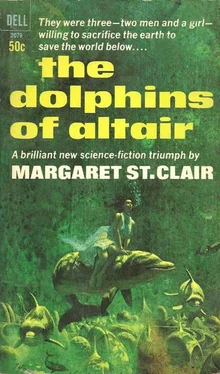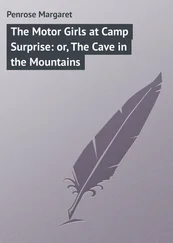“Well, whatever caused it, I guess we’re safe for another fifty years. Let’s get going, Bill. We’ve got a big day in front of us.”
“OK.” He finished his beer and threw the can out to bob beside the other one. The two men scrambled up on the dock. We heard them walking away.
Dr. Lawrence sat up, brushing sand from Ms jacket. He said nothing, but we felt he was annoyed. He turned the flashlight on and began to get things out of his bag.
When he had cleaned and dressed Sosa’s wound, he gave her another drink. Then, still stooping, he waded out toward where we were.
“Madelaine can’t stay here,” he said softly. “She ought to be in a hospital, or at least in a decent bed. This is a hell of a place for a sick woman. I want to take her away.”
“No. We forbid you to.” I knew I spoke for all of us.
“Why? It would be better for her.”
“Would it? As long as she was conscious, she said she wanted to stay with us. She begged us not to let us be separated. If we let you take her away, how do we know we’ll ever see her again?”
“But I promise—”
“I’m sorry. I’m afraid we just don’t trust you that much.”
He was silent, his head bent. “It’s very difficult for me to take proper care of her here,” he said at last.
“Whose fault is it she’s lying there?” Ivry asked.
Lawrence sighed. “While we’re on this subject,” Pettrus said, “what about the explanations and apologies you were going to give us? Now would be a good time for them.”
“Yes.” Lawrence waded back up under the dock and sat down on the dank sand.
“I’ve always been a believer in luck and fate,” he said slowly, as if he were arranging his ideas. “The unexpected seems to me more important in human affairs than the expected and the rational. It’s a gambler’s temperament, in a way. Or perhaps it’s what Madelaine meant when she said I had an appetite for the marvelous.
“At any rate, when I decided to try to get to Noonday Rock, I had no way of knowing what I should find there. I thought it was likely—or at least possible—that Madelaine was on the Rock, and that dolphins had taken her there. But I didn’t know how many other people were there with her, or what their attitude to an intruder would be.
“I was willing to risk it. The possibilities were too interesting to be ignored. But I thought it was wise to try to reduce the risk.”
“Do you call that gambling?” I said. “It’s the action of a cautious man.”
“There was an element of gambling in it,” he protested. “There was less than one chance in three that what I brought with me would work.”
“Well, go on. What did you bring with you when you came to Noonday Rock?”
“A communication device.”
“You didn’t mention this when you told us about your preparations for coming to the Rock. Why, after you found we were friendly, were you so secretive?”
“I don’t know,” he answered. “Perhaps I wasn’t quite sure.”
“I know why you didn’t tell us,” Ivry said. (Ivry was the most excitable of the three of us, just as Pettrus was the biggest and I was the one who knew the most genealogies.) “You were spying on us for the navy the whole time!” Emotion overcame him, and he flapped his tail furiously.
“No,” Lawrence answered. “The navy didn’t even know I had the device. I stole it, actually.”
“What was the name of the device?” I asked. “Where did you have it hidden?”
“It’s something called COLABS—collimated laser beam signal. What I stole was an experimental model, very much miniaturized. I had it in my briefcase.”
“So that’s why you kept such a hold on the briefcase,” I said. “When did you decide to use the COLABS thing?”
“It wasn’t really a decision,” he said. “I’d promised to help Madelaine in her war against the human race. But I’m a human being myself. I couldn’t help feeling, part of the time, that I was engaged in something treasonable.”
“You were the most bitter against Splits of any of us!” Ivry gabbled. “Whenever we had scruples, you argued us out of them!”
“Oh, I know. I expect I was trying to repress my own doubts.”
“Well, go on. You sent out a signal with the COLABS thing, didn’t you?” I said.
“I tried the COLABS to see if it would send out a signal,” he corrected.
“You mean you never sent out a message at all?” I asked, puzzled at what he meant.
“Oh, I sent out a message. But it was only because…”
“Dr. Lawrence, you said you had an explanation to make. You’re not explaining anything, or even apologizing. Tell us what your actions were, what you actually did.”
“All right.” It was obviously hard for Mm to speak.
“On Sunday morning,” he said finally, “after the worst part of the quake was over, the dolphins left me alone on the Rock.”
“They left you because you told them to!” Ivry said. “You sound as if they’d deserted you!”
“Do I? I didn’t mean to. Anyhow, I was alone for the first time in several days, with an opportunity to think.
“It seemed to me that I’d done a terrible thing. I thought of all the damage I’d helped to cause, of all the people who’d been hurt or killed. On impulse—useful word, impulse,” he said wryly, “I opened my briefcase and took the COLABS out. I set it up on the Rock, and turned the switch. The monitor light came on. And I knew it would work.
“Up until that time, I hadn’t been sure what I meant to do. But this seemed like a—a nudge from fate. I thought, I’ll go ahead and see if anybody answers my signal. Because, if there was only about one chance in three that the COLABS was capable of sending out a focused signal, it was even more uncertain that anybody would be listening.”
“Why was it so unlikely that the COLABS device would work?” Pettrus asked. “Don’t communication devices generally work?”
“I suppose it seems like that, to a dolphin. Actually, they had all sorts of trouble with the power source. I had one of the engineers in therapy with me for a couple of months because he was so upset over the difficulties. And the adjustment of such a small mechanism was delicate. Carrying it around in my briefcase might have jarred it loose.
“Anyhow, I pressed the signal button. It sends out an impulse that is received by the beamed station as a steady buzzing.
“I held the button down for about a minute and a half, and nothing happened. I was just about to take my finger off it, and forget the whole thing and pack the COLABS device back in my briefcase, when I heard a voice say, ‘COLABS 32! COLABS 32! We get your signal! Where are you speaking from?’”
Dr. Lawrence sighed. “I could have refused to answer, of course,” he said. “But that my signal had been received at all seemed a kind of miracle. Nobody was regularly stationed at the receptor; it wasn’t even turned on most of the time. I found out later that a technician had just happened to go into that lab to do some soldering on an electrical connection. While he was waiting for the soldering iron to warm up, he’d switched the receptor on. And he heard my signal coming out of it. If the timing had been off a little, nobody would have heard me.”
“It was bad luck for us that he did,” I said.
“Yes. But he answered me. And again, I felt it was fate. I—well, that’s the way it was.
“I told him where I was speaking from, and said that I knew something about the earthquake. He called somebody, and that person called somebody else. They sent a ’copter out to the Rock for me. By nine o’clock, I was telling my story to a rear admiral.”
“The admiral that was mentioned in the piece in the Chronicle?” Pettrus asked.
Читать дальше












